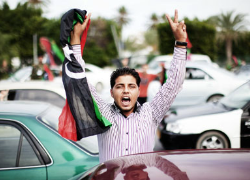
As the dust from the armed intervention in Libya settles, the dangers of outright regime change are laid bare. This has brought about a certain amount of what might be called buyer’s remorse on the part of organizations and governments previously supportive of the humanitarian intervention in Libya. One of the main problems of regime change is the power vacuum left by the previous regime. Once the previous regime is removed, the ensuing vacuum opens up space for various previously repressed or insignificant power brokers to take prominence in the new order. In the case of Libya, removing the Qaddafi regime precipitated the rise of local government and militias at the expense of the central government. Additionally, the sudden release of oppressive pressure from the top has led to acts of retribution based on longstanding grudges. These acts of retribution have been both organized and unorganized, and human rights organizations, such as Amnesty International and Human Rights Watch, accuse the Libyan anti-Qaddafi militias of gross and widespread human rights violations. Homelessness, violence, and lawlessness are widespread and acts of retaliation against the Tuareg population are ubiquitous.
In the last few days, the rift between the central government and the local power brokers hit the world stage with the detention of the International Criminal Court’s delegation. The delegation was on its way to visit Saif al-Islam Qaddafi, Muammar Qaddafi’s son, when a local militia group detained them in the western town of Zintan. Although the central government and the ICC have demanded their release, the militia has refused. The refusal lays bare the divisive issue of prosecution of the previous regime. Although the ICC has asserted jurisdiction over members of the previous regime, the Zintan militia and other factions within the Libyan state have expressed their desire to have members of the previous regime tried in Libyan courts.
The ICC has a statutory responsibility of complimentarity to domestic jurisdictions; that is, the ICC may only take jurisdiction over a case if the domestic courts are unwilling or unable to prosecute. Although various human rights organizations, and the ICC itself, have expressed doubts about the capability of the Libyan judicial system and, moreover, the state of human rights within the Libyan state, various factions within Libya assert that the judicial system is willing and able to prosecute members of the previous regime.
Other divisions since the end of the Qaddafi regime are becoming apparent, as relations between the majority Arab population and the minority Tuareg population demonstrate. Indeed, whereas the speedy removal of Colonel Qaddafi was hailed as a victory for the principle of the responsibility to protect, recent attacks by local and national militias, particularly against the city of Tawargha, have been decried as war crimes, undermine that progress. These crimes might also fall under the jurisdiction of the ICC, though a continued relationship with the new Libyan regime would be necessary in order to bring the violators to justice. Such a continued fruitful relationship seems unlikely at this point.
These divisions underline the importance of the humanitarian aspects of any humanitarian intervention. It is apparent that armed intervention in support of a civilian revolution is insufficient to fulfill humanitarian goals, and that, as demonstrated in Afghanistan and Iraq, regime change must be followed with extensive support to rebuild infrastructure and civil and political institutions. Invoking a responsibility to protect during the armed intervention and then stepping back to allow the inevitable violent effects of regime change to take their natural course is irresponsible at best, and criminal at worst. The responsibility to protect must apply not only to vicious dictators, but also to well-meaning intervening states. That is to say, in order to be a meaningful, coherent policy, any state invoking the responsibility to protect must include a plan to address the consequences of their actions, including the prosecution of members of the previous regime and the ensuing violence and retaliation.


